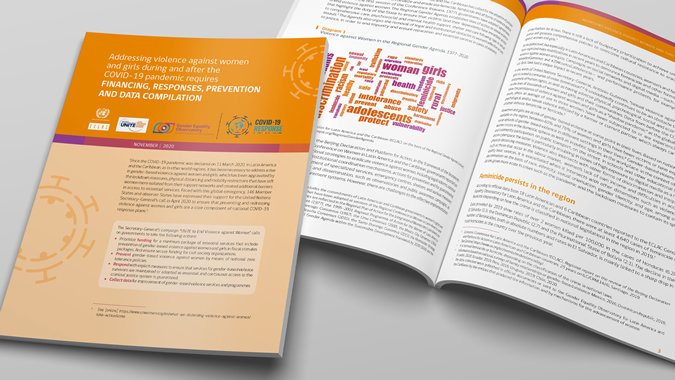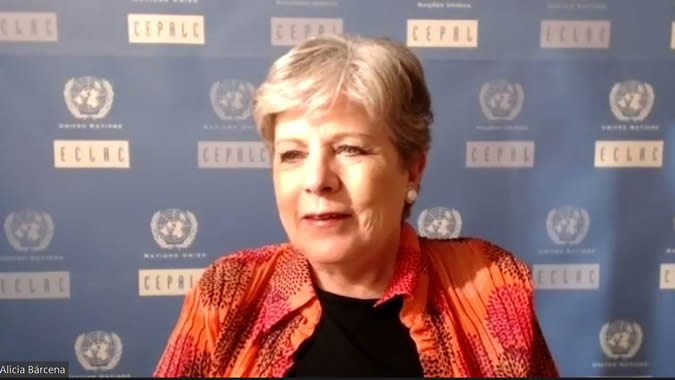ECLAC: The Persistence of Violence against Women and Girls in the Region and Femicide, its Maximum Expression, is Troubling
Work area(s)
The strategy to urgently tackle this veritable “shadow pandemic” should be based on four pillars: funding, prevention, response and data collection.

The Economic Commission for Latin America and the Caribbean (ECLAC) expressed its concern today over the persistence of gender-based violence against women and girls in the region and high rates of femicide, or feminicide. According to the latest official data reported to the Commission’s Gender Equality Observatory for Latin America and the Caribbean (GEO), in 2019, 4,640 cases of femicide were recorded in 24 countries (18 in Latin America and 6 in the Caribbean).
The situation of women and girls has been aggravated under confinement and the restrictions on movement ordered by countries in the face of COVID-19, which limited their access to support networks and assistance-related services, ECLAC indicates in a document published in the framework of the International Day for the Elimination of Violence against Women, which is commemorated each year on November 25 and which launches 16 days of activism through to December 10, which is International Human Rights Day.
“Gender violence occurs systematically in our region. It knows no borders, affecting women and girls of all ages and taking place in all types of spaces: in workplaces, in the context of political and community participation, on transportation and in the street, in schools and educational centers, in cyberspace and – without a doubt – within homes. This is what we in the United Nations system have called a ‘shadow pandemic,’” said Alicia Bárcena, ECLAC’s Executive Secretary.
According to national surveys from six countries in the region, between 60% and 76% of women (around 2 out of every 3) has been the victim of gender-based violence in distinct areas of their life. In addition, on average, 1 out of every 3 women has been a victim of or is now suffering physical, psychological and/or sexual violence at the hands of a perpetrator who was, or is, her intimate partner, which entails the risk of lethal violence: femicide.
“Our message is resounding: violence against women, no matter where it occurs, is unacceptable. The multiple manifestations of violence that women experience, and femicide as its maximum expression, are preventable. We need everyone, women and men, for this change to happen,” emphasized Bárcena, urging countries to orient their strategies by following the recommendations of the United Nations Secretary-General, António Guterres, in the framework of the UNiTE Campaign, which promotes “funding, prevention, response and data collection” to address this veritable shadow pandemic.
Governments in the region have informed ECLAC’s COVID-19 Observatory in Latin America and the Caribbean of more than 90 measures aimed at tackling violence against women during this period. Particularly standing out is the response of countries where all or part of the services to assist in this scourge were declared essential. However, the adaptation to remote modalities has been very complex and it limits access to justice, which increases the risk of impunity surrounding these crimes, ECLAC warns.
Likewise, the saturation of health care services due to the health crisis and restrictions on people’s movement have affected assistance for victims of sexual violence.
The document indicates that “the large number of complaints made on help lines and in person demands that public action be strengthened, with an increase in fiscal resources and measures that would ensure comprehensive care in social services and access to justice through active and expedited channels.”
“To overcome gender-based violence against women and girls, policies are needed that address the structural constraints of inequality, mainly those stemming from discriminatory and violent patriarchal cultural patterns,” ECLAC states. “Progress must be urgently made, in a comprehensive and accelerated way, towards guaranteeing women’s rights and their autonomy in its economic and physical dimensions and in terms of decision-making.”
Related content

Alicia Bárcena: We Call for a Redoubled Commitment to Eradicating the “Shadow Pandemic” of Violence against Women and Girls in the Region
ECLAC’s Executive Secretary spoke at a high-level political event held in the framework of the International Day for the Elimination of Violence against Women, which is being commemorated this…
Related link(s)
Country(ies)
- Latin America and the Caribbean
Contact
Public Information Unit
- prensa@cepal.org
- (56 2) 2210 2040
